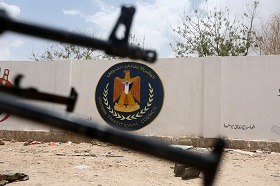Ending Yemen's bloody civil war is critical first and foremost for the country's long-suffering people. But a peace deal would also serve as a confidence-building step toward stability in the Middle East, and would send a positive signal at a time of increasing international friction and polarization.
The long-running conflict in Yemen is riper for resolution than ever before. Yemenis on all sides are exhausted by the fighting and were quick to embrace the appeal issued in March by United Nations Secretary-General António Guterres for a global ceasefire amid the COVID-19 pandemic. The following month, the Saudi-led coalition in Yemen announced a two-week unilateral ceasefire, which it subsequently extended.
The warring parties have already made significant progress toward a ceasefire agreement, in negotiations brokered by the UN Special Envoy for Yemen, Martin Griffiths. Furthermore, the separatist Southern Transitional Council (STC), which is backed by the United Arab Emirates, agreed in June to resume talks with Yemen’s Saudi-backed government, thereby ending the fighting in Abyan, Shabwa, and Socotra provinces.
Iran, which supports the rebel Houthi movement (formally known as Ansar Allah, or Supporters of God), has no strategic reason to stand in the way of an agreement. Critically, although international powers including the United States, Russia, China, India, and leading European states are struggling to cooperate over Yemen, they are unlikely to obstruct progress toward ending the fighting.
From the Kremlin to Whitehall to the White House, the desirability of ending the suffering in Yemen is widely recognized. Our countries have nothing to gain from the civil war continuing. Indeed, on July 1, the UN Security Council passed a resolution supporting Guterres’s appeal for a global ceasefire, a decision that can be leveraged to help Yemen.
There is much to build on, but the opportunity must be seized. The current window to end the civil war will not remain open for long, and recent advances are now in jeopardy. If the window closes without the warring parties reaching a peace deal, Yemen risks descending into further chaos and conflict, raising the specter of a continuing catastrophe on the strategic Bab el-Mandab Strait.
The tragic conflicts in Libya and Syria have devolved into complicated proxy wars that are not amenable to international mediation. Yemen is still some distance from that point, partly because fewer outside players are directly engaged in the conflict. But time is not on its side. Missing the current opportunity for peace would be unconscionable, given Yemen’s rapidly rising number of COVID-19 infections and its inability to respond to the pandemic.
The remaining obstacles to a permanent ceasefire and a political deal include the conditions for opening the Sana’a airport and Hodeida port. The STC’s declaration of self-rule in April and the violence that followed have also complicated the peace process. And Ansar Allah’s June 23 attack on Riyadh underscores the risk of further escalation of fighting between the Houthis and the Saudi-led coalition. But none of these stumbling blocks is insurmountable.
Yemen’s looming humanitarian disaster and its people’s pleas for peace require action on three levels.
First, the warring parties should accept and immediately implement the UN-brokered ceasefire proposal, building on the Saudi-led coalition’s unilateral pause.
Second, President Abd-Rabbuh Mansour Hadi’s Saudi-backed government and the STC should continue talks regarding the implementation of the November 2019 Riyadh Agreement signed by the two sides. The STC’s July 29 announcement that it would abandon its aspirations for self-rule marks a significant step forward that one hopes will further de-escalate tensions.
Third, the international community must encourage all parties to the conflict to turn recent positive momentum into a comprehensive, durable, and just political settlement. A solution based on power sharing would allow Yemen to rebuild, prosper, and restore good relations with its neighbors. A Gulf Cooperation Council-led reconstruction effort in Yemen and a revitalization of regional trade would support this process and herald a new era of cooperation in the Gulf and the Arabian Peninsula. Although the warring parties must take the first steps forward, regional and global actors have an important role to play in ending the conflict now.
This November’s G20 summit in Riyadh gives Saudi Arabia an opportunity to display international leadership and demonstrate progress on Yemen. Greater support for a deal from the international community, and especially the global powers, can tip the balance in favor of a lasting agreement.
Peace is critical first and foremost for the long-suffering Yemeni people. But a lasting settlement would also serve as a confidence-building step toward stability in the Middle East, and would send a broader positive signal at a time of increasing international friction and polarization.
Opportunities to resolve a prolonged civil war are rare. Ending the conflict in Yemen would save lives, bring hope to a failing region, and perhaps provide some inspiration for a tottering world.
First published in the Project Syndicate.







